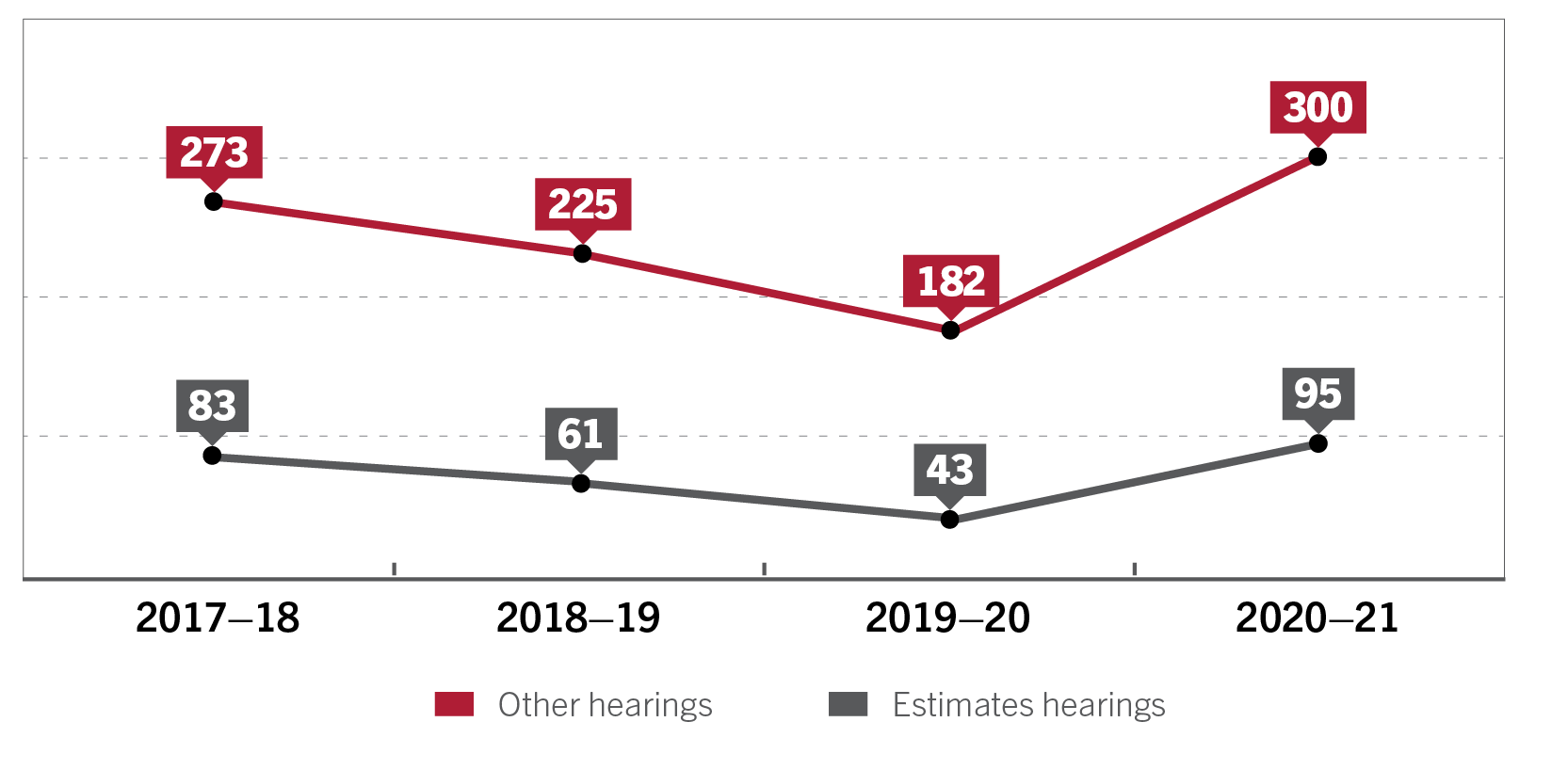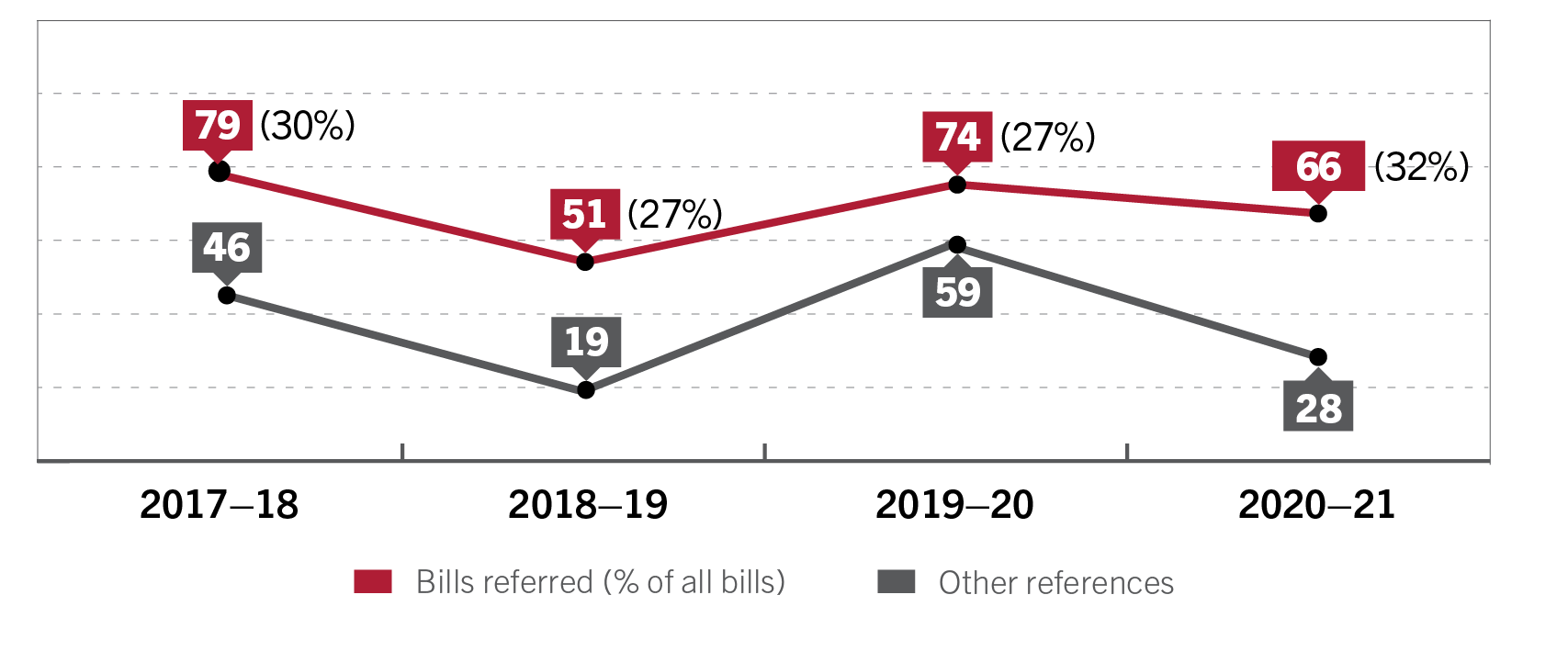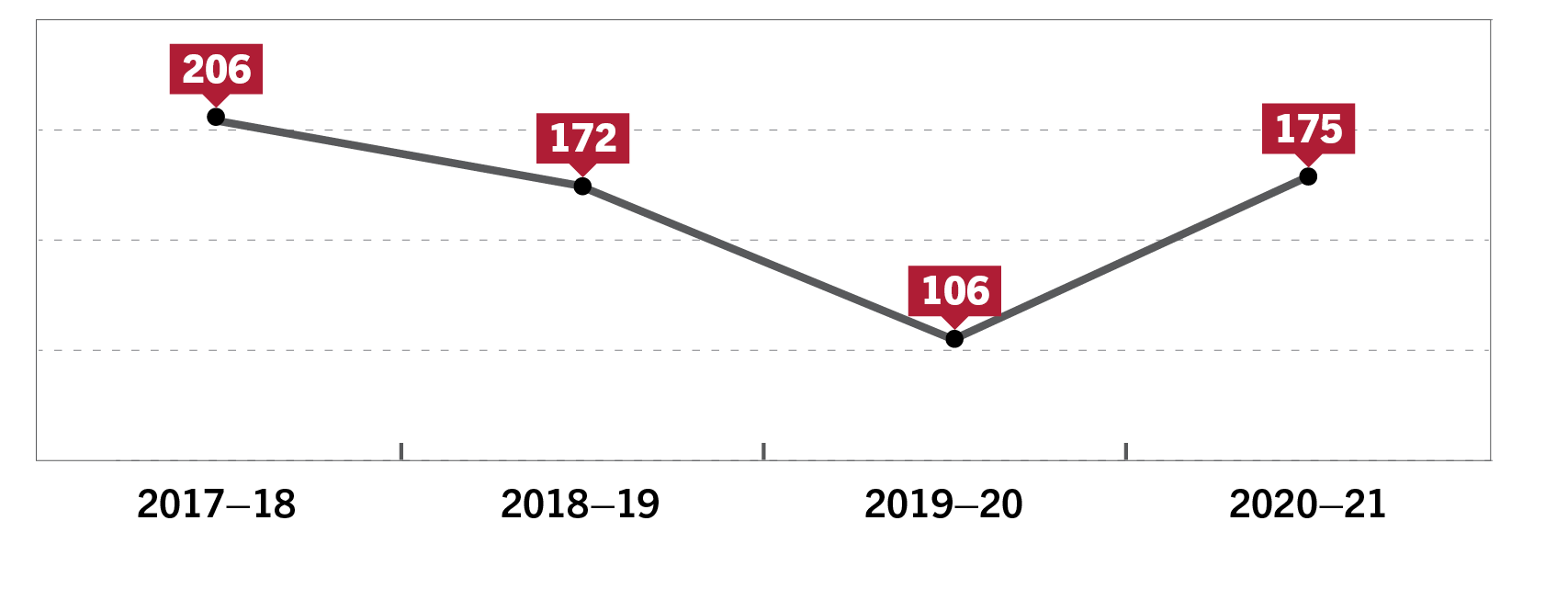| Outputs |
Secretariat support and procedural advice to the legislative and general purpose standing committees, select committees, and certain joint committees. |
The degree of satisfaction of the chairs of committees, committee members and other senators with the quality and timeliness of advice and support. |
Formal and informal feedback, including reference to committee reports during debates in the Senate, shows that senators consider the support provided by the Committee Office to be effective. |
Draft reports, reports and other documents are timely, accurate and of a high standard. Tabling deadlines are met. |
Accurate advice, documentation, and draft reports were provided to committees in accordance with their requirements.
Reports were drafted and presented to the Senate in accordance with the timeframes agreed by committees and deadlines set by the Senate. |
Inquiry information, evidence and reports are published promptly upon authorisation. |
Information was updated promptly and accurately on committee web pages. Submissions, other documents and reports were published consistent with the decisions of committees. |
Inquiries from the public regarding committees are handled promptly and professionally. |
Telephone and email queries from the public were responded to promptly and accurately.
Members of the public had access to up to date, accurate and relevant material regarding committee activities and procedures. |
Overview
Committee Office secretariats supported 16 legislation and references standing committees, eleven Senate select committees, two joint select committees and five other joint committees (see figure 12). As in the previous year, secretariats experienced a demanding workload, with large numbers of inquiries and hearings taking place. The cost of the office in 2020–21 was $10.4m ($9.6m in 2019–20), with staff salaries comprising approximately 92 per cent of the office’s total expenses.
The remaining costs were administrative (for example, printing, venue hire and transport and accommodation for secretariat staff attending hearings). These administrative costs were reduced across the financial year due to the impact of the COVID-19 pandemic, largely as a result of a reduced number of interstate hearings.
Committee secretariats provided administrative support to committees, including processing submissions, publishing a range of material to committee websites, arranging private meetings and briefings, liaising with witnesses and stakeholders, and arranging public hearings and site inspections around Australia and by video and teleconference. Staff analysed and collated the evidence committees received, drafted briefing material and reports, arranged for the tabling and publication of reports, and assisted witnesses and others to participate in inquiries. In addition, secretariats provided procedural advice to chairs, committee members and other stakeholders, and responded to requests for information from members of the public about the operation of committees.
The impact of the COVID-19 pandemic reduced the number of interstate hearings held throughout the year, and placed limits on the number of hearings that could be held in-person. However, the Committee Office workload was sustained, with committees making use of the ability to hold hearings via video and teleconference. This ensured that committees received the evidence they required from a wide range of witnesses in order to meet their reporting responsibilities to the Senate.
Feedback from members of committees when reports are tabled or debated in the Senate, and in the House of Representatives in relation to certain joint committees, and provided informally during the course of the year, indicates a high level of satisfaction with the quality of the advice and support. Feedback received by way of a survey of committee chairs and conducted through the Chairs’ Committee (which is chaired by the Deputy President of the Senate) showed that committee chairs were also very satisfied with the services provided by secretariats. While results were positive, the survey responses included some suggestions for improvement and future development. These suggestions focused on providing visual broadcast of public hearings held outside of Parliament House, and more opportunities for senators to undertake training on the role of the committee chair. The department will work with the Department of Parliamentary Services to investigate how an expanded broadcasting service can be provided and will offer additional training and support for committee chairs.
Activity levels and workload
The Committee Office workload is determined by decisions of the Senate and of the committees themselves. During this reporting period, the Committee Office continued to deliver secretariat and drafting services to committees to enable them to conduct inquiries and table reports consistent with the time frames set by the Senate. The highest number of inquiries managed at one time was 69.
Submissions, public hearings and witnesses
The high volume of work undertaken by committee secretariats during 2020–21 is demonstrated by the high level of administrative support provided to committees. This included processing over 10,800 submissions, an increase of more than 3,500 submissions when compared with the previous reporting period. In addition, secretariats arranged 395 public hearings (including 95 estimates hearings) at which over 7,500 witnesses appeared. Secretariats supported committees by arranging 563 private meetings and eight site inspections.
Figure 12 – Elements and responsibilities of the Committee Office
| Executive |
Procedural advice and training.
Planning and coordination.
Secretariat staffing and resources.
Statistics and records. |
Community Affairs
Jeanette Radcliffe (to 12 July 2020)
Apolline Kohen (from 13 July 2020 to 11 June 2021)
Pothida Youhorn (from 12 June 2021)
Economics
Mark Fitt
Education and Employment
Alan Raine
Environment and Communications
Stephen Palethorpe
Finance and Public Administration
Ann Palmer (to 9 August 2020)
Sarah Redden (from 10 August 2020)
Foreign Affairs, Defence and Trade
Lyn Beverley
Legal and Constitutional Affairs
Sophie Dunstone
Rural and Regional Affairs and Transport
Gerry McInally
Additional Support Unit
Lee Katauskas |
Joint statutory
Australian Commission for Law Enforcement Integrity
Sean Turner
Corporations and Financial Services
Patrick Hodder
Law Enforcement
Sean Turner
Joint standing
National Broadband Network
Lee Katauskas
National Disability Insurance Scheme
Bonnie Allan
Joint select
Australia’s Family Law System
Ann Palmer (to 28 July 2020)
Tas Larnach (from 29 July 2020)
Road Safety
Gerry McInally |
Effectiveness of the Australian Government’s Northern Australia agenda
Lee Katauskas
Multi-Jurisdictional Management and Execution of the Murray Darling Basin Plan
Sean Turner
Financial Technology and Regulatory Technology
Lyn Beverley
Autism
Alan Raine
Foreign Interference through Social Media
Lee Katauskas
Temporary Migration
Lee Katauskas
Administration of Sports Grants
Jeanette Radcliffe (to 12 July 2020)
Apolline Kohen (from 13 July 2020 to 18 March 2021)
COVID-19
Jane Thomson (to 12 July 2020)
Jeanette Radcliffe (from 13 July 2020)
Aboriginal Flag
Sophie Dunstone
Tobacco Harm Reduction
Patrick Hodder
Job Security
Tas Larnach |
Figure 13 – Number of committee hearings, 2017–18 to 2020–21

To manage this volume of work, the office continued to operate flexibly with staff regularly working across secretariats, supporting different committees, and joining staff in other programs within the department on cross-program project teams when their workload permitted. Demonstrating professional flexibility is a key capability of Committee Office staff, and supports the department’s ability to deliver high quality services to committees.
Estimates hearings
The 2020 budget estimates hearings, initially scheduled to take place in May 2020, were delayed to October 2020 as a result of the COVID-19 pandemic. Additional estimates followed in March 2021, and the 2021 budget estimates occurred in May and June 2021. As shown in figure 13, there were 95 estimates hearings, up from 43 hearings in the previous period. During these estimates hearings, just over 3,500 witnesses appeared. The elevated number of estimates hearings during 2020–21 occurred as a result of delays to estimates hearings in the previous financial year.
Significant planning was undertaken and protocols developed to ensure that estimates hearings took place under COVID-safe conditions. Committees were able to make use of expanded access to videoconference facilities, implementing a hybrid system where senators and witnesses were able to participate remotely and in-person. This maintained committees’ entitlement to examine and scrutinise the expenditure of the executive, and meet their obligations to report to the Senate, despite the uncertainty caused by the pandemic.
References and reports
In addition to a high number of legislation inquiries, committees inquired into and reported on diverse topics including the Australian Government’s response to the COVID-19 pandemic, Fetal Alcohol Spectrum Disorder, autism, the administration of Australia Post, and financial and regulatory technology.
Figure 14 – Number of references to committees, 2017–18 to 2020–21

The office supported committees to table a total of 175 reports. Figure 15 indicates how the COVID-19 pandemic resulted in fewer reports tabled during the 2019–20 year. Committees quickly adapted their work practices to enable more reports to be tabled during the 2020–21 year, despite the ongoing impact of the pandemic.
Figure 15 – Reports presented by all committees supported by the Committee Office 2017–18 to 2020–21

Each committee report, while initially drafted by Committee Office staff is, in the end, a committee document which reflects the views of members of the committee undertaking the inquiry. Feedback indicates that despite the pressure created by the high number of inquiries, and sometimes short time frames, the standard of committee reports has been maintained. This has been achieved through the dedication and skill of secretariat staff, with support from staff of other areas of the department when required.
Public information
Providing accurate, accessible and relevant public information about the work of Senate committees is an area of ongoing focus.
The office continued to work with the Senate Public Information Office and the Department of Parliamentary Services on projects to improve systems and tools for drafting and publishing reports, and to manage the high volume of submissions and answers to questions on notice provided to committees during estimates and other hearings. Tools, systems and processes that enable prompt, accessible publication of committee evidence and reports are an essential part of the Committee Office’s responsibility to ensure committee information is processed, analysed, and published in a timely way. They also ensure that information is relevant and accessible, that senators are satisfied with services provided, and that efficiencies can be realised.
To further develop these systems and processes, additional staff were allocated to the Office of the Senior Clerk, providing a dedicated project team to offer committee office-specific ICT and web publishing support and training, and to progress ICT projects in collaboration with the Senate Public Information Office and the Department of Parliamentary Services.
The Committee Office Executive, comprising the Office of the Senior Clerk and the Office of the Clerk Assistant (Committees) continued the significant focus on collecting, analysing and publishing statistics and data generated by the Committee Office, including the twice-yearly publication Work of Committees and ensuring that information about committee membership and hearings was up to date and publicly accessible via the Senate website.
Committee Office staff supported the department’s seminar program by delivering training sessions to public servants and other members of the public about the operation of Senate committees, as well as delivering training offered by the Parliamentary Library for parliamentary staff.
International engagement
The usual demand for Committee Office staff to present information to international delegations visiting Australia, and for certain committee secretaries to support outgoing parliamentary delegations was suspended due to the COVID-19 pandemic. However, during April 2021 Committee Office staff provided support to committees of the Parliament of Tonga by way of a virtual mission.
Management and leadership
Under standing order 25(10) a Chairs’ Committee comprising the chairs of standing committees and Senate select committees may be convened by the Deputy President to discuss any matter relating to the operations of those committees. The Clerk Assistant (Committees) is the secretary. During 2020–21, this committee met to consider issues including levels of committee activity, the application of the privilege resolutions, and satisfaction of senators with committee office services.
Committee secretaries met regularly throughout the year to discuss corporate and administrative issues, staff development and organisational capability, and procedural matters. Supporting staff well-being was also a focus during these meetings.
Staffing levels in the committee office were increased to meet the sustained demand of committees, contributing to staff well-being by ensuring there were sufficient resources and staff are able to take regular leave.
Performance outlook
The 2020–21 reporting period saw the Committee Office support a sustained number of inquiries. Despite the reduction in committee travel and uncertainty caused by the ongoing pandemic, the office continued to deliver high levels of support to committees including the tabling of 175 reports, and the processing of almost 11,000 submissions. Reduced activity in terms of inquiries is expected in 2021–22 as a result of an anticipated election. Despite the reduced activity in committee inquiries that is expected, recruiting, training and retaining a dedicated, professional and committed staff will remain a priority of the Committee Office. Staffing levels are expected to be maintained to ensure that the Department can meet the future demands of the Senate and its committees. The office will support staff development through a range of strategies including peer and on-the-job learning, at-level forums, cross-program projects, formal training such as tertiary study, and enhanced procedural training.
The Committee Office will continue its focus on staff well-being by offering a rewarding work environment that values collaboration, and where managers demonstrate a commitment to health and well-being, and to developing the capability of their teams.
The Committee Office plans to build on strong relationships across the parliamentary service. Opportunities to work on mutually beneficial projects with colleagues in the Department of Parliamentary Services, the House of Representatives’ Committee Office and the Parliamentary Budget Office offer staff the chance to develop relevant skills and knowledge, and enhance our ability to offer high quality services to the Senate and its committees. Similar shared projects, such as a mentoring trial that was initiated in 2020–21 between the research branch of the Parliamentary Library and the Committee Offices of the Departments of the House of Representatives and the Senate, will be pursued.
Feedback about enhanced services, including the ability for committees meeting interstate to have their hearings broadcast visually, and increased opportunities for chairs to participate in training were received during the 2021 survey of committee chairs. The department will offer additional training for committee chairs in the coming year, and while broadcasting of committee hearings is the responsibility of the Department of Parliamentary Services, the committee office welcomes the opportunity to work across the parliamentary service to consider ways in which this service can be delivered.
Collaboration with the Department of Parliamentary Services ICT team is expected to result in an enhanced program for drafting and publishing committee reports in the 2021–22 year which will contribute to efficiency and productivity. An additional project between the Senate Table Office and the Senate Public Information Office is expected to allow for electronic tabling of certain published documents, creating efficiencies across the department.